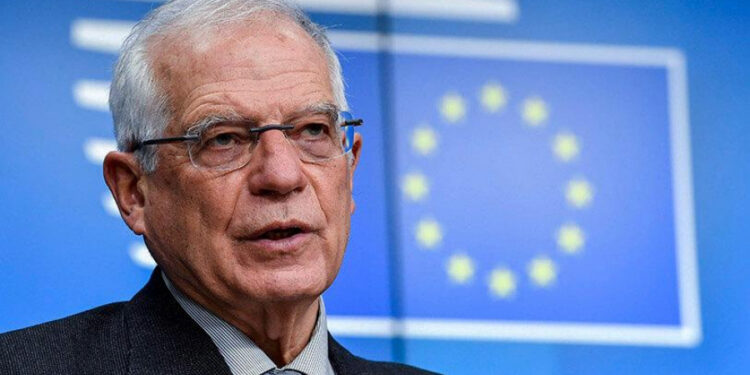“Europe and Africa, partners for a common future”, it is under this title that the high representative of the European Union for Foreign Affairs and Security Policy, Josep Borrell, published a platform on EU/Africa relations on the occasion of its African tour.
“I go this week to Africa this week, a dynamic continent that prepares its future by promoting digital transformation, by making its agriculture more efficient and lasting, by building new infrastructure to strengthen the links between peoples, by shaping collective security of the continent and investing in the greatest resource in Africa: its youth.
In all these areas, we propose that Europe become the partner of choice of Africa. European investments in Africa are more than five times greater than those of China. A quarter of African trade is done with the EU against only 15% with China and 2% with Russia and 90% of African exports enter the EU as a franchise of rights.
The EU works with its African partners to build the first continent’s vaccine factories and we approved, at the UA-UE summit, an investment program of 150 billion euros as part of the “Global Gateway”. With the European facility for support for peace and our training missions, we help strengthen peace and security.
However, the future of the world is darkened by the devastating consequences of the Russian war against Ukraine on food security, energy prices and security issues. This war affects all continents, but Africa is one of its main collateral victims. We know that some countries on the continent envisage this war from a different angle from ours, but we can, I think, to grant ourselves on four fundamental points.
First: Europe, Africa – and the whole world – cannot accept a world where “strength is the right”, where the great powers can claim “spheres of influence” and attack their neighbors to annex their territory.
Russian aggression against Ukraine is a perfect example of the type of cruel imperialism that Africa experienced in the 19th and 20th century. It is precisely because Europeans are aware of their responsibilities at that time that the EU intends to oppose this revival of imperialism.
We must invigorate multilateralism to defend the rule of law, as we decided during the recent EU-Africa summit. This is particularly why the EU supports President Sall’s appeal in favor of a siege in the G20 for the African Union.
Second: we must react without delay to the food crisis. With more than 70 partners, many of whom in Africa, the EU acts according to four axes: solidarity with those who do not have the means to eat; support for food production; Facilitation of agricultural trade, in particular by the routing of Ukrainian cereals to Africa; Alignment of our response with that of the multilateral system, with the United Nations at the heart of the device.
Meanwhile, others try to divert from their responsibility by rejecting the fault of the sanctions. However, the facts are clear. EU sanctions do not prohibit African countries from importing Russian agricultural products, or paying them. It is the Russian war that poses a problem. If however our African partners were faced with concrete problems that seem to be linked to our sanctions, we will examine this question together.
Third: we must intensify our common work to preserve Africa’s security and security. In this area, with 11 missions, the EU is the most reliable partner on the continent. Last April, we gave the African Union 600 million euros additional for conflict prevention, crisis management and the fight against terrorism.
This week, I go to Mozambique and Somalia. In Mozambique, the EU supports the armed forces to restore security in the province of Cabo Delgado, and our aid is now 89 million euros. We are also finalizing support for the contingents of the Southern African Development Community (SADC) and Rwanda.
Likewise, Somalia can count on our missions to combat piracy and training of the Somali armed forces. With 2.3 billion euros, the EU has also been reliable support for the AU mission in Somalia for over 10 years.
With 78 people, Russia contributes very little to the United Nations peace operations in Africa, compared to the 6000 soldiers of the EU countries. On the contrary, Russia contributes to the deterioration of security in Africa with several hundred mercenaries of private companies such as Wagner or Patriot. This presence only aggravates crises and multiplying human rights violations, as seen in Mali and in the Central African Republic.
Fourth: Africa and Europe must prepare for the future instead of turning to the past. Some try to resuscitate old diagrams to divide us, but it is to ignore the long path traveled together.
Colonialism is an indelible spot for Europe, but assuming our responsibility for the past has made us a better partner for the future. Europe is now looking at Africa with optimism and confidence and always gives priority in our partnership with “African solutions to African problems”.
However, others seem to be tempted to repeat the errors made formerly by Europeans, seeking to appropriate African raw materials, to control land, to place African countries in financial dependence or to exploit the dynamism of their youth to their advantage.
We work to strengthen our strategic autonomy and we support the will of Africa to do the same. We must work with multiple partners, based on mutual respect and international law. This is the rule of the game in the 21st century. It is in this context that Africa and Europe must deepen their cooperation, because we share a common future. ”








